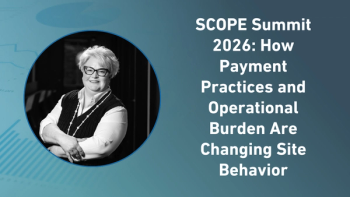
- Applied Clinical Trials-11-01-2006
- Volume 0
- Issue 0
Recruitment & Consent in India
India continues to gain the attention of pharmaceutical companies looking for a place to conduct clinical trials because of the country's reputation for fast subject recruitment rates. But as Jane Barrett reveals, sometimes the country's clinical trial participants are more uninformed than informed.
A recent BBC documentary1 showed the results of an investigation into clinical trials in India. Echoing the book The Constant Gardener, it did uncover some disturbing practices.
Jane Barrett
More than three quarters of the top 50 Western biopharmaceutical companies are currently conducting clinical research in India,2 and it is estimated that by 2010 there could be two million research patients in India. The unease expressed in the program was that some of these patients were unaware of taking part in research.
Several patients were interviewed, stating that they had taken trial medications because their doctor asked them to, but had no awareness of what the drugs were, their potential effects, or the fact that they were experimental. Without exception these patients were very poor, and clearly felt their doctors to be superior in status and intelligence.
Compromised consent
One patient seemed to sum up the concerns. He was taken off antipsychotic medication and entered into an acute mania study. "I didn't know that experiments were being carried out on me. I was told that the old drugs were discontinued and were no longer available. I am poor and I live in a small hut and I don't understand many things. The doctors are intelligent. They write the drugs for me so I have to take them accordingly." Several doctors interviewed confirmed that informed consent was not properly sought and obtained.
A suggested benefit for patients in the less-developed world entering research is that they cannot otherwise afford treatment. Being in a study provides even those receiving placebo with a full health screen and care for the trial's duration. So leaving aside issues of true freedom of consent one could say that they are no worse off in the study, and perhaps better off.
However, the major reason put forward for targeting patients in emerging countries such as India is not that they will benefit but that the rate of recruitment is faster. The concern raised by this program and by many commentators is that rapid recruitment may be at the cost of true informed consent. The loss of this fundamental principle of research derives from a combination of poverty, ignorance, and total trust in doctors. Trial medication is free, patients are often in awe of their doctors, and it does not occur to them to ask questions.
But consent to take part in a trial must be given after the receipt and discussion of information. It must be freely given, without "coercion, undue influence or inducement, or intimidation."3 There is evidence that this is not always the case in the less-developed world.
Patient vulnerability
India is increasingly popular for clinical research. The rapid growth of Contract Research Organizations is testament to that, and there is evidence of a reverse brain drain as Indian physicians and scientists return from Europe and the United States.
There has always been a focus by pharmaceutical companies on "time to market" during drug development, and the often quoted "$1 million a day" cost of delay must surely now be much higher. Recruitment (and retention) of research subjects is the rate-limiting step in clinical research, and one can entirely understand the desire of companies to place studies where patients are numerous, usually treatment naïve, and seemingly willing to take part in research. When that willingness is in truth due to a lack of power, money, education or all three, the validity and ethical acceptability of using these patients comes into question.
The Nuremburg code states that "The voluntary consent of the human subject is absolutely essential." It further says that the patient should be "able to exercise free power of choice." Many observers have very real concerns that some—and I stress some—studies carried out in India may not be following these most basic of principles.
References
1. Drug Trials: The Dark Side, BBC Documentary, 27 April 2006.
2. Globalization of Drug Development: India. Cambridge Healthtech Associates, June 2006.
3. Council for International Organizations of Medical Sciences (CIOMS), 1993.
Jane Barrett, MBBS, Medical Adviser and Director, MedicoLegal Investigations
Articles in this issue
over 19 years ago
Building Your Clinical IT Teamover 19 years ago
Tough Trials Ahead for Europe's Drug Industryover 19 years ago
Experts Urge Major Overhaul at FDAover 19 years ago
eShowcase: iPlan Flowover 19 years ago
Pharmacogenomics Enters the Japanese Marketover 19 years ago
Meet the EAB: Somesh Nigamover 19 years ago
Merging eHR & EDC Conferenceover 19 years ago
Deploying Mobile Devices in Clinical Trials: Part Twoover 19 years ago
eShowcase: Clintrace 4.1over 19 years ago
eShowcase: PharmaReady V3.0Newsletter
Stay current in clinical research with Applied Clinical Trials, providing expert insights, regulatory updates, and practical strategies for successful clinical trial design and execution.




